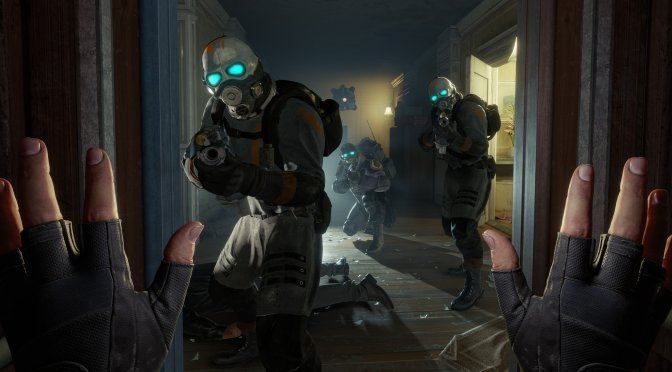YouTube’s ‘MxBenchmarkPC’ has shared a video, showcasing the latest version of the NoVR Mod for Half-Life Alyx running at 8K and Ultra settings on an NVIDIA GeForce RTX 4080.
For those unaware, the NoVR Mod allows you to play Half-Life Alyx on a PC monitor, without the need of a VR headset. This is a must-have mod for those who want to experience this latest Half-Life game on a non-VR device.
Developed by the GB_2 Development Team, Half-Life Alyx NoVR is an impressive project. And, since Valve does not plan to implement a way via which you can experience Alyx on non-VR devices, it’s a must for every HL fan. Or at least for those who want to play it.
As we can see, a single NVIDIA GeForce RTX 4080 can handle this game at 8K on Ultra settings. MxBenchmarkPC has locked the framerate at 60fps. And, as you’ll see, the RTX 4080 is able to offer a locked 60fps at almost all times.
Now from what I can see in the frametime graph, there are some spikes. This could be due to the framerate lock (we’ve seen this happening in other games when locking their framerate). That, or the NoVR Mod introduces stutters to the game at specific locations. The reason I’m saying this is because the official/original VR version did not suffer from any stutters. Or at least I don’t remember any of them.
You can go ahead and download the mod from this link. If you are a big HL fan, you should definitely check it out. It’s not perfect, but it’s currently in a state that most non-VR gamers are able to play.
Enjoy and stay tuned for more!

John is the founder and Editor in Chief at DSOGaming. He is a PC gaming fan and highly supports the modding and indie communities. Before creating DSOGaming, John worked on numerous gaming websites. While he is a die-hard PC gamer, his gaming roots can be found on consoles. John loved – and still does – the 16-bit consoles, and considers SNES to be one of the best consoles. Still, the PC platform won him over consoles. That was mainly due to 3DFX and its iconic dedicated 3D accelerator graphics card, Voodoo 2. John has also written a higher degree thesis on the “The Evolution of PC graphics cards.”
Contact: Email

